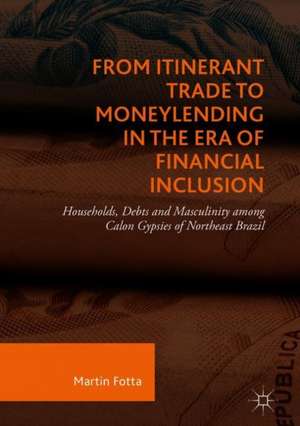From Itinerant Trade to Moneylending in the Era of Financial Inclusion: Households, Debts and Masculinity among Calon Gypsies of Northeast Brazil
Autor Martin Fottaen Limba Engleză Hardback – 10 oct 2018
More broadly, this volume examines how ethnic difference is created in a context where fixed and collective structures supporting ethnic identity are missing. It is important reading for economic anthropologists, cultural economists and all those interested in processes of financialisation from a local perspective, as well as those fascinated by informal economies, how exchange and debt relate to social and political marginality, and how financial credit becomes 'domesticated' by communities.
| Toate formatele și edițiile | Preț | Express |
|---|---|---|
| Paperback (1) | 523.91 lei 6-8 săpt. | |
| Springer International Publishing – 22 dec 2018 | 523.91 lei 6-8 săpt. | |
| Hardback (1) | 702.54 lei 6-8 săpt. | |
| Springer International Publishing – 10 oct 2018 | 702.54 lei 6-8 săpt. |
Preț: 702.54 lei
Preț vechi: 826.53 lei
-15% Nou
Puncte Express: 1054
Preț estimativ în valută:
134.45€ • 145.99$ • 112.94£
134.45€ • 145.99$ • 112.94£
Carte tipărită la comandă
Livrare economică 22 aprilie-06 mai
Preluare comenzi: 021 569.72.76
Specificații
ISBN-13: 9783319964089
ISBN-10: 3319964089
Pagini: 252
Ilustrații: XII, 250 p. 9 illus., 5 illus. in color.
Dimensiuni: 148 x 210 mm
Greutate: 0.58 kg
Ediția:1st ed. 2018
Editura: Springer International Publishing
Colecția Palgrave Macmillan
Locul publicării:Cham, Switzerland
ISBN-10: 3319964089
Pagini: 252
Ilustrații: XII, 250 p. 9 illus., 5 illus. in color.
Dimensiuni: 148 x 210 mm
Greutate: 0.58 kg
Ediția:1st ed. 2018
Editura: Springer International Publishing
Colecția Palgrave Macmillan
Locul publicării:Cham, Switzerland
Cuprins
Chapter 1: Introduction: Consolidation of the Cigano Moneylending Niche in the Early Twenty-first Century.- Part I: Settlements, Personhood and the Centrality of Households.- Chapter 2: ‘There are Ciganos in the Town’.- Chapter 3: Household Fixity as a Process.- Chapter 4: Makers of their Futures.- Part II: Assimilation of the Local Economic Environment into Calon Sociality.- Chapter 5: Deferred Payments and the Expanding Moment of Caloninity.- Chapter 6: Lending Money to Jurons.- Chapter 7: Moneylending Niche as Householding.- Chapter 8: Epilogue: The Crisis, The Stranger, and The State.
Notă biografică
Martin Fotta is Postdoctoral Research Fellow at the Department of Social and Cultural Anthropology at Goethe University Frankfurt, Germany. His key areas of research are economy and value, ethnic economies, Nomadic strategies, masculinity and gender, money, credit and debt, cash transfers, and constructions of ethnicity.
Textul de pe ultima copertă
This book analyses how Calon Gypsies in Brazil have responded to global financial transformations and shifted their economic practices from itinerant trade to moneylending. It also explores their role as ethnic credit providers, offering rare insight into the financial lives of poor and lower-middle-class Brazilians.
More broadly, this volume examines how ethnic difference is created in a context where fixed and collective structures supporting ethnic identity are missing. It is important reading for economic anthropologists, cultural economists and all those interested in processes of financialisation from a local perspective, as well as those fascinated by informal economies, how exchange and debt relate to social and political marginality, and how financial credit becomes 'domesticated' by communities.
Martin Fotta is Postdoctoral Research Fellow at the Institute for Ethnology at Goethe University, Frankfurt, Germany. His key areas of research are economy and value, ethnic economies, Nomadic strategies, masculinity and gender, money, credit and debt, cash transfers, and constructions of ethnicity.
More broadly, this volume examines how ethnic difference is created in a context where fixed and collective structures supporting ethnic identity are missing. It is important reading for economic anthropologists, cultural economists and all those interested in processes of financialisation from a local perspective, as well as those fascinated by informal economies, how exchange and debt relate to social and political marginality, and how financial credit becomes 'domesticated' by communities.
Martin Fotta is Postdoctoral Research Fellow at the Institute for Ethnology at Goethe University, Frankfurt, Germany. His key areas of research are economy and value, ethnic economies, Nomadic strategies, masculinity and gender, money, credit and debt, cash transfers, and constructions of ethnicity.
Caracteristici
Explores how itinerant traders maintain their social identities in the era of the global financial integration Traces how Calon gypsies maintain autonomy by means of debt-creating exchanges Analyzes how informal systems of credit exchange are being transformed in the twenty-first century, using Romanies in Latin America as a case Challenges the Eurocentric view that persistence of Gypsy identity among the Calon is an outcome of their rejection by the majorities
